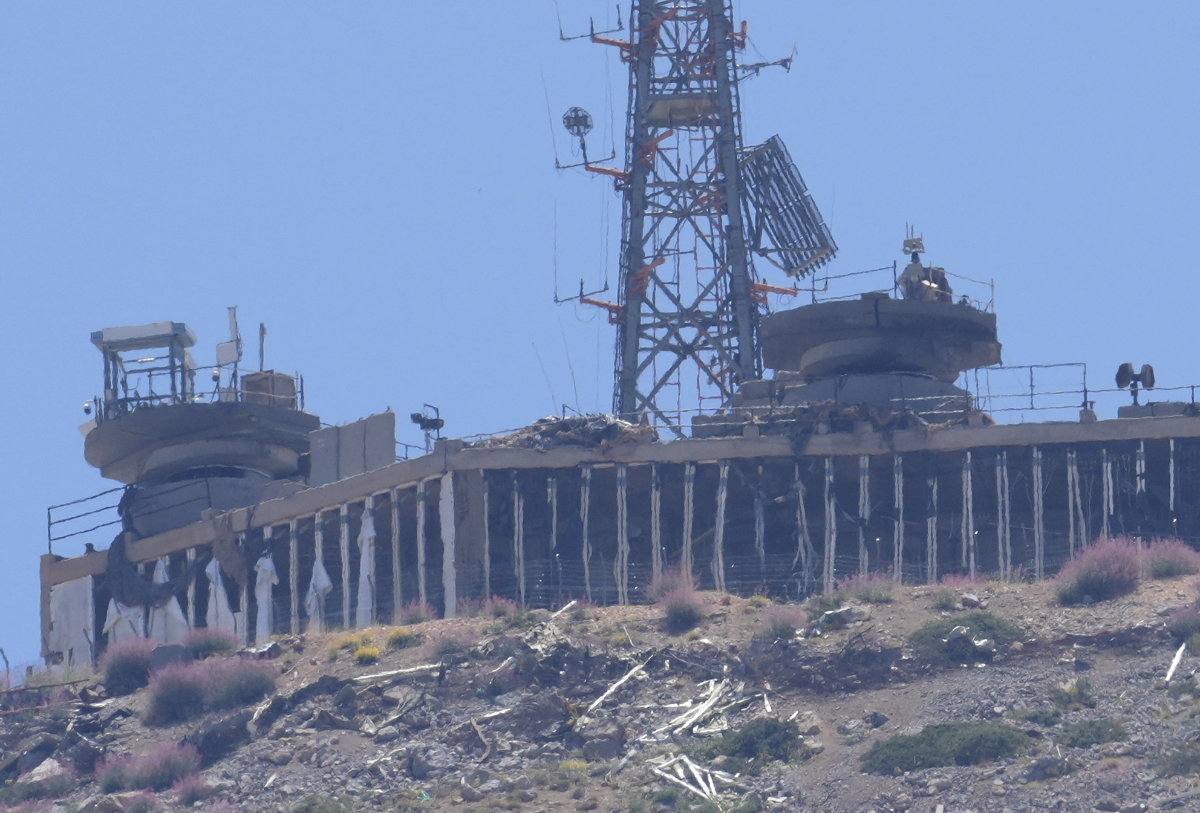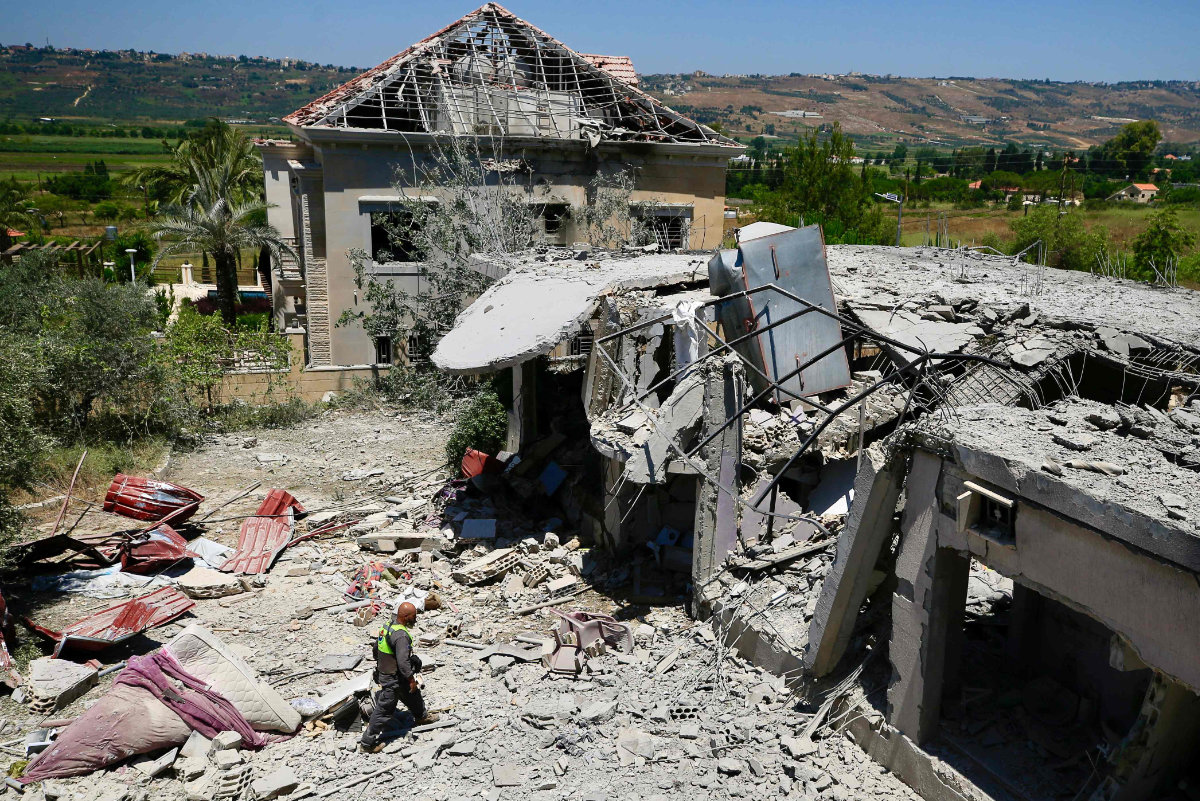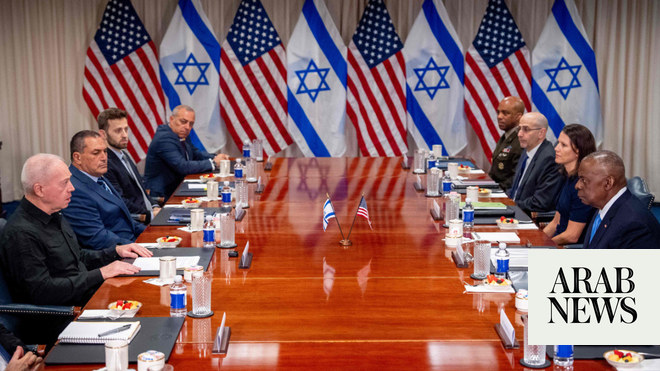WASHINGTON: Israeli Defense Minister Yoav Gallant said during a visit to Washington that his country does not want a war in Lebanon but is ready to inflict “enormous damage” on Hezbollah if diplomacy fails.
“We don’t want war, but we are preparing for every scenario,” Gallant told reporters during the visit that ended on Wednesday. “Hezbollah understands very well that we can cause enormous damage to Lebanon if a war starts,” he said.
Tensions have been rising as border skirmishes between Israel and Iran-backed militia have intensified since the Oct. 7 Hamas attack, which sparked a relentless Israeli retaliatory campaign in Gaza.
Gallant said Israel has killed more than 400 Hezbollah “terrorists” in recent months.

Israel’s defense minister was in Washington for three days and met with officials in an attempt to quietly resolve a rift over U.S. arms supplies, a stark contrast to Prime Minister Benjamin Netanyahu’s more confrontational approach.
“We made significant progress during the meetings, we removed obstacles and we removed bottlenecks,” Gallant said after meeting with Jake Sullivan, Biden’s national security adviser.
Gallant said the progress was made on “different issues,” including “the subject of the buildup of forces and the supply of ammunition that we need to provide to the state of Israel.”
“I would like to thank the U.S. administration and the American people for their continued support for the State of Israel,” he said.
In recent days, Netanyahu has publicly accused the Biden administration of slowing down arms deliveries to Israel, which has been at war in Gaza since the October 7 Hamas attack.
US officials have denied the accusations and expressed irritation months before an election in which Biden’s support for Israel has become a liability and the left wing of his Democratic Party is outraged by the high death toll among Palestinian civilians.
The United States in early May froze a shipment of 2,000-pound bombs, and Biden warned of a further freeze as he pressed Israel not to launch a large-scale military attack on Rafah, a city in southern Gaza that is home to more than a million displaced Palestinians. he was looking for shelter.
A senior U.S. administration official said the United States has sent more than $6.5 billion worth of weapons to Israel since October 7, including nearly $3 billion in May alone.
“It’s a huge, huge undertaking and nothing is being held back except for one shipment,” the official told reporters on condition of anonymity.
The official blamed the split on disagreements over the “complicated” US bureaucratic process. He said Gallant’s team and American experts went through “every case.”
“There has been real progress and mutual understanding of the current state of affairs and prioritization of some issues over others so that we can make sure that we move forward in a way that meets the needs of Israelis,” he said.

Biden – whose approach to Israel has drawn criticism from both progressives and the right – held off on cutting arms supplies after Israel carried out what U.S. officials called relatively targeted operations in Rafah.
Netanyahu and Gallant said the most intense phase of fighting is over, with Israel moving to move forces toward the border with Lebanon after intensifying skirmishes with the Iran-backed militant movement Hezbollah.
A U.S. official said Washington is in “pretty intense talks” with Israel, Lebanon and others and believes neither side is seeking a “major escalation.”
Gallant, who met twice in Washington with Amos Hochstein, the American intermediary between Israel and Lebanon, assured that his country was trying to avoid all-out war with the Iran-backed Hezboll militia in Lebanon.
“We don’t want war, but we are preparing for every scenario,” Gallant told reporters.
US officials, including Secretary of State Antony Blinken, have expressed hope that a ceasefire in Gaza could also lead to a reduction in tensions over Lebanon.
On May 31, Biden unveiled a plan for a temporary ceasefire and the release of the hostages, but Hamas made further demands.
Despite criticism of the proposal from some far-right allies, Netanyahu Gallant said: “We are all committed to the president’s agreement and we strongly support it.”
“Hamas must accept this or face the consequences,” he said.
According to AFP data based on Israeli data, the war in Gaza began on October 7 with a Hamas attack on southern Israel, which killed 1,195 people, mostly civilians.
Militants also took about 250 hostages, 116 of whom are still in the Gaza Strip, although the army says 42 of them are dead.
According to the Hamas-led health ministry in Gaza, at least 37,718 people, most of them civilians, were killed in the Israeli retaliatory offensive.

